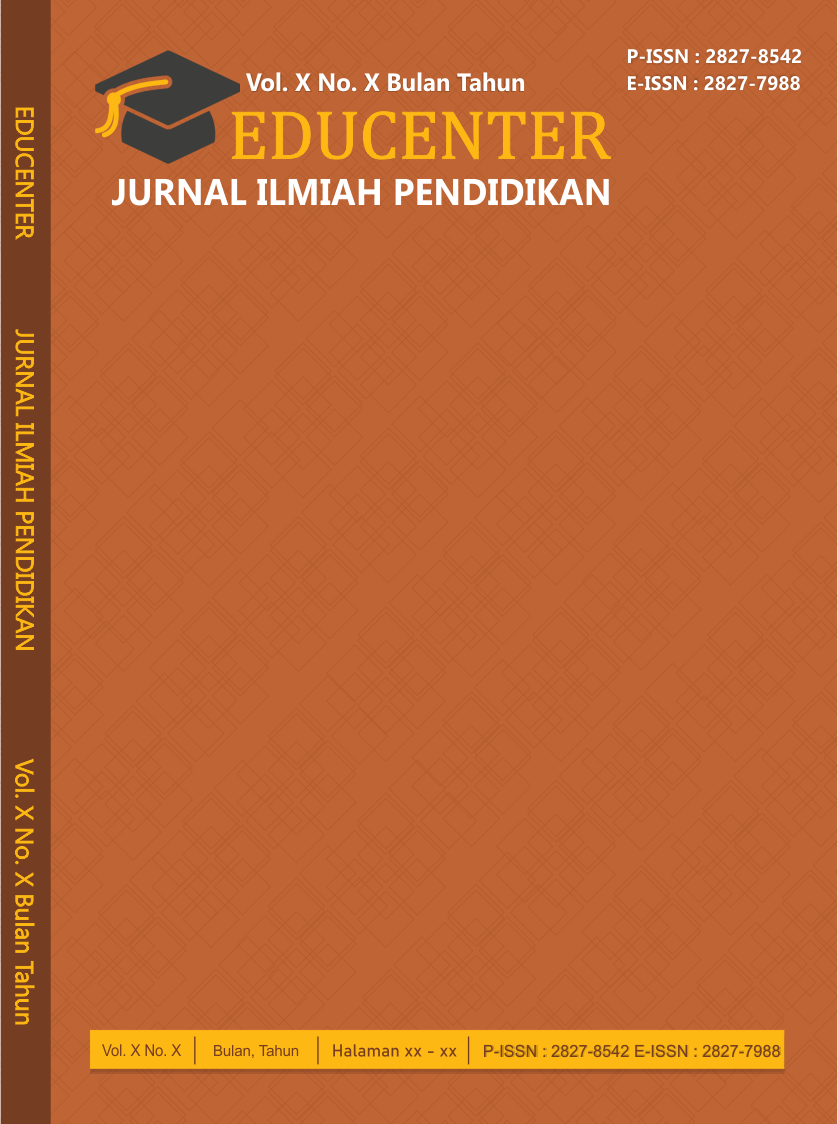Development of electronic modules (e-modules) for islamic religious education (PAI) learning based on flipbook at SMPN 1 Tanggetada
Main Article Content
Abstract
This research aims to develop a learning media in the form of a Flipbook-based E-Module for Islamic Religious Education (PAI) for seventh-grade junior high school students and to test its validity, practicality, and effectiveness. The method used is research and development with the ADDIE model. Validation was conducted by media experts and subject matter experts, while the practicality test was carried out by PAI teachers, and the effectiveness test was conducted on students through a questionnaire. The results of the media expert validation showed that the E-Module was classified as very valid with an average score of 3.9, while the subject matter expert validation obtained an average score of 3.3, which falls into the valid category. The practicality test by teachers obtained an average score of 95, which means it is very practical, indicating that the product is easy to use and meets the learning needs. Meanwhile, the effectiveness test obtained an average score of 91, which is categorized as very effective, with the material aspect receiving the highest score of 94. Based on these results, it can be concluded that the Flipbook-based E-Module developed is suitable for use in Islamic Religious Education and can enhance student engagement and understanding. This product can also serve as an alternative innovative learning media in the digital era.
Article Details
Section

This work is licensed under a Creative Commons Attribution-NonCommercial 4.0 International License.
How to Cite
References
Alawiyah, F. (2014). Pendidikan madrasah di Indonesia. Aspirasi: Jurnal Masalah-Masalah Sosial, 5(1), 51–58. https://doi.org/10.46807/aspirasi.v5i1.449
Anandari, Q. S., Kurniawati, E. F., Marlina, M., Piyana, S. O., Melinda, L. G., Meidiawati, R., & Fajar, M. R. (2019). Pengembangan modul elektronik motivasi belajar siswa dengan menggunakan aplikasi kvisoft flipbook berbasis etnhokonstruktivisme. Pedagogik: Jurnal Pendidikan, 6(2), 416–436. https://doi.org/10.33650/pjp.v6i2.584
Arfandi, A. (2020). Pemanfaatan media pembelajaran dalam meningkatkan kualitas pembelajaran PAI di sekolah. Edupedia: Jurnal Studi Pendidikan Dan Pedagogi Islam, 5(1), 65–77.
Aulia, R. (2024). Penerapan Media Pembelajaran “Smart App Creator (SAC)” Pada Mata Pelajaran Pendidikan Agama Islam Untuk Meningkatkan Motivasi Belajar Peserta Didik Kelas XI IIS 2 SMA Negeri 1 Mowewe. Jurnal Teknologi Pendidikan Madrasah, 7(2), 41–55.
Charlina, C., Septyanti, E., Mustika, T. P., & Rahmi, A. (2022). Electronic module as learning needs to write exposition texts for junior high school students. Journal of Education and Learning (EduLearn), 16(2), 219–225. https://doi.org/10.11591/edulearn.v16i2.20402
Damayanti, E. (2021). Penggunaan Media Big Book Untuk Menumbuhkan Minat Baca Siswa di Sekolah Dasar. Social, Humanities, and Educational Studies (SHES): Conference Series, 4(6), 1386–1392. https://doi.org/10.20961/shes.v4i6.70571
Dikti, K. (2018). Undang-Undang Nomor 2 Tahun 2003 Tentang Sistem Pendidikan Nasional.
Khasanah, I., & Nurmawati, I. (2021). Pengembangan modul digital sebagai bahan ajar biologi untuk siswa kelas XI IPA. Indonesian Journal of Mathematics and Natural Science Education, 2(1), 34–44. https://doi.org/10.35719/mass.v2i1.57
Koderi, K., & Husin, G. S. (2021). Pengembangan media pembelajaran AVIA (Audio Visual Arab) untuk peserta didik sekolah menengah atas (SMA). Al-Tadzkiyyah: Jurnal Pendidikan Islam, 12(2), 231–247. https://doi.org/10.24042/atjpi.v12i2.10087
Lah, N. H. C., Hashim, M., Harun, J., & Abdullah, Y. (2024). The evaluation of problem-solving oriented e-module in learning computer-based subject. International Journal of Evaluation and Research in Education, 13(1), 547–558. https://doi.org/10.11591/ijere.v13i1.25486
Laili, I. (2019). Efektivitas pengembangan e-modul project based learning pada mata pelajaran instalasi motor listrik. Jurnal Ilmiah Pendidikan Dan Pembelajaran, 3(3), 306–315. https://doi.org/10.23887/jipp.v3i3.21840
Maharcika, A. A. M., Suarni, N. K., & Gunamantha, I. M. (2021). Pengembangan modul elektronik (E-Modul) berbasis flipbook maker untuk subtema pekerjaan di sekitarku kelas IV SD/MI. PENDASI Jurnal Pendidikan Dasar Indonesia, 5(2), 165–174. https://doi.org/10.23887/jurnal_pendas.v5i2.240
Mudrikah, S., Ahyar, D. B., Lisdayanti, S., Parera, M. M. A. E., Ndorang, T. A., Wardani, K. D. K. A., Siahaan, M. N., Hanifah, D. P., Amalia, R., & Siagian, R. C. (2022). Inovasi pembelajaran di abad 21. Pradina Pustaka.
Nursafitri, L., Widaryanto, W., & Zubaidi, A. (2020). Pengembangan modul pembelajaran pendidikan agama Islam (PAI) kelas IV madrasah ibtidaiyah. INVENTA: Jurnal Pendidikan Guru Sekolah Dasar, 4(1), 91–99. https://doi.org/10.36456/inventa.4.1.a2304
Purnamasari, C., & Amal, A. (2021). Pengaruh media busy book terhadap kemampuan membaca awal anak di taman kanak-kanak. Jurnal Pendidikan Raudhatul Athfal, 4(1).
Royhanin, Y., & Sungkono, S. (2022). Pengembangan E-Modul Berbasis Hypercontent Untuk Siswa Smk. Epistema, 3(2), 50–58. https://doi.org/10.21831/ep.v3i2.44437
Sofa, S. K., & Zahra, A. (2022). Pengembangan Modul Elektronik Menggunakan Pendekatan Pembelajaran Kontekstual Untuk Siswa Kelas X Madrasah Aliyah Negeri 1 Pangkalpinang. JEMST (Journal of Education in Mathematics, Science, and Technology), 5(2), 56–65. https://doi.org/10.30631/jemst.v5i2.80
Sugiyono. (2016). Metode Penelitian Kunatitatif Kualitatif dan R&D. Alfabeta, Bandung.
Waluya, S. B., Sukestiyarno, Y. L., & Cahyono, A. N. (2022). E-Module Design Using Kvisoft Flipbook Application Based on Mathematics Creative Thinking Ability for Junior High Schools. International Journal of Interactive Mobile Technologies, 16(4). https://doi.org/10.3991/ijim.v16i04.25329
Zuliana, S., Hardianti, S., Damayanti, Y. A., & Nasir, M. F. A. (2023). Penerapan Metode PAIKEM Pada Pembelajaran Bahasa Jawa di Madrasah Ibtidaiyah Kelas Rendah. Jurnal Riset Madrasah Ibtidaiyah (JURMIA), 3(2), 157–166. https://doi.org/10.32665/jurmia.v3i2.1826

